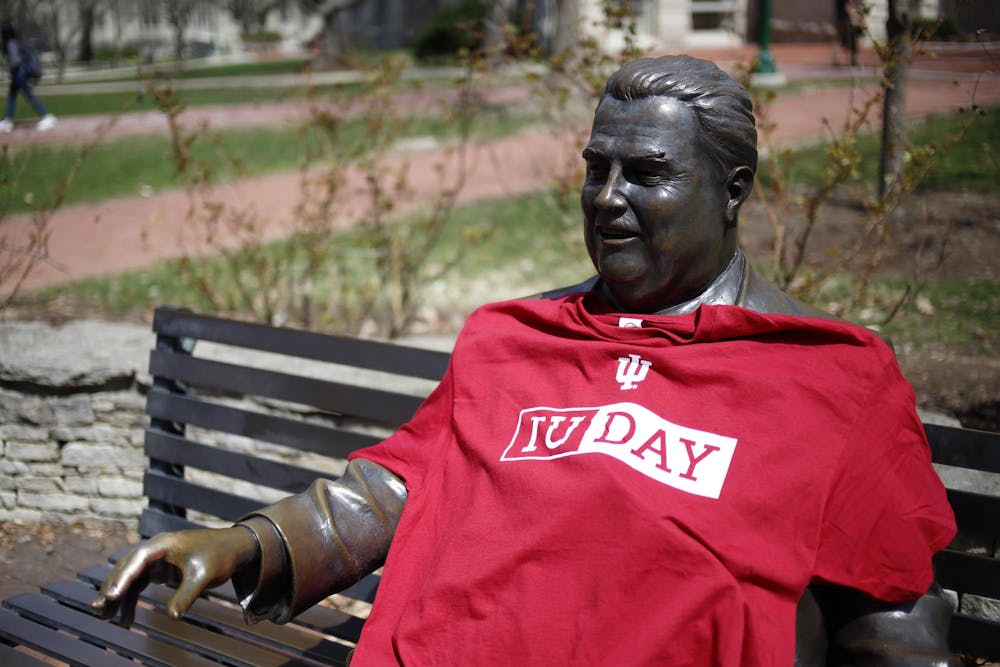Editor's note: All opinions, columns and letters reflect the views of the individual writer and not necessarily those of the IDS or its staffers.
Today is IU Day, when we honor Indiana University and the remarkable individuals who make it possible. As we don cream and crimson, and celebrate our enduring connection to this institution, we are called to reflect on what truly enables our university to thrive. Beyond its buildings and endowments, IU's greatness has always rested upon twin pillars: its people and its principles.
Herman B Wells understood that a great university draws its strength from the vibrant community that gives it life and purpose. Throughout his legendary tenure, Wells recognized that IU's success was inextricably linked to the flourishing of its students, faculty and staff—each person "precious in her eye," representing "a unique individuality and… a divine opportunity."
Wells built IU's reputation upon three enduring principles. First, he championed academic freedom as the bedrock of discovery. Second, he pioneered shared governance, understanding that authority in a university "must be derived from reason, not from position." Third, he demonstrated extraordinary moral courage, standing firm against external pressures that might compromise IU's integrity and independence.
"I had early made up my mind," Wells wrote in his 1980 autobiography, “Being Lucky: Reminiscences and Reflection.” "That a university that bows to the wishes of a person, group, or segment of society is not free."
This unwavering commitment to principle attracted generations of brilliant minds to Bloomington and beyond, establishing IU as a beacon where truth and light could flourish.
As we celebrate IU's achievements today, thoughtful members of our community have raised legitimate questions about our institutional direction. Are we still the university where, as Wells insisted, "reason is exalted over emotion and force?" The April 2024 arrests at Dunn Meadow — a site with deep historical significance for free expression — have prompted many to ask whether we're maintaining our commitment to open discourse. Similarly, when major university decisions proceed without meaningful input from faculty, students and staff, do we honor Wells' vision of shared governance?
While external pressures mount from political, financial and reputational forces, are we standing firm in defense of our institutional integrity? How do we recommit to these foundational principles? The path forward requires courageous leadership and collective responsibility, grounded in both tradition and innovation.
First, we must reaffirm our unwavering commitment to academic freedom and open inquiry. Wells championed the fearless pursuit of knowledge, recognizing that universities can only fulfill their societal mission when intellectual exploration remains unfettered. This protection transcends ideology — it's the essential oxygen that sustains discovery and learning.
Second, we must reimagine shared governance for contemporary challenges. Wells exemplified leadership through consensus rather than decree, gradually introducing initiatives only after wide discussion and debate and recognizing that diverse perspectives inevitably strengthen outcomes.
Third, transparency must become our institutional habit. When our community understands not just what decisions are made but why, the university operates with greater legitimacy and wisdom.
Finally, we must stand firm against pressures that would compromise our mission. A university fulfills its highest purpose when it upholds its values even when doing so is difficult. By defending our academic principles with moral courage, we protect not just institutional integrity, but the very purpose of higher education in a democratic society.
As we celebrate IU Day, let us remember that IU has always been more than buildings or traditions — it is, at its heart, a community united in pursuit of knowledge and truth. Today, the responsibility for upholding these essential principles falls to all of us: students, faculty, staff, administrators, trustees, and alumni. Each of us must become stewards of academic freedom, shared governance, and moral courage.
On this IU Day and beyond, let us honor our university not just through celebration, but through our collective commitment to reimagining Wells' vision for a new era. By recommitting to these foundational principles, we ensure that Indiana University will continue to illuminate paths of discovery for generations to come — a beacon of light and truth in an ever-changing world.
Justin Vasel received his doctorate in Physics from Indiana University Bloomington in 2021. He has maintained an active interest in university governance, including currently running as an alumni-nominated candidate for the IU Board of Trustees.






